When the days get longer, hens will naturally lay more eggs. If you have 12 hens, you could find yourself with nearly 6 dozen eggs each week. Unless you eat eggs for every single meal, that can add up.
Storing them in the fridge is a good option for long-term storage, but what happens when you run out of space?
Did you know you could dehydrate eggs to make your own easy-to-store powdered eggs?
Indeed, you can dehydrate eggs in a dehydrator if you keep them there at 160 °F (71 °C) for 10 hours (to kill all salmonella)… until they look flaky.
Alternatives to Dehydrated Eggs
Before I get into the nitty-gritty of dehydrating eggs, there are a few things you need to know about preserving eggs in general.
There aren’t a ton of ways you can preserve eggs for long-term storage that won’t totally alter the flavor and consistency.
While dehydrating eggs allows you to enjoy them as you would normally in a typical scrambled state, other methods, like pickling or fermenting eggs, alter the flavor and composition of the eggs quite considerably.
Benefits of Dehydrating Eggs
Powdered eggs are great for long-term storage. Dehydrating scrambled eggs for backpacking, camping, and even bug out bags helps to make quick and easy on-the-go meals!
It also helps keep the nutritional value (minerals, vitamins, etc.) intact so you don’t lose any much-needed nutrients or flavor.
Today, I am going to show you how…
First off, why would I dehydrate eggs even though I have backyard chickens? Well, there are times when the girls aren’t laying as well, such as going through a molt or during the extreme heat of summer, or the shorter days of winter.
Having some long-term storage of eggs to bake with is a comforting feeling to have. Trust me.
For those who do NOT have backyard chickens, you can easily stock up on eggs when they are on sale, dehydrate and be able to use them anytime, saving you money. (win-win)
You can also buy eggs that are already dehydrated. Why would you want to do this?
Well, if you’re headed out on a backwoods camping trip and want to take a good source of protein with you (without having to lug around a fragile carton of eggs), then dehydrated eggs are the way to go.
However, these are often loaded with preservatives and anti-caking agents. They can also trigger food allergies and usually aren’t made from hens who laid their eggs in the most ethical conditions.
Uses for Dehydrated/Powdered Eggs
You can use dehydrated/powdered eggs for a wide variety of baking projects including:
- Jelly bases
- Cookies
- Cakes
- Pastries
- Doughnuts
When frozen, a dehydrated egg can add a bit of extra volume to a cake. Dehydrated egg whites can be used to make meringue (yum!) and cream icing.
Problems with Dehydrating Eggs
Some people have difficulty grinding the dehydrated egg(s) into powder. Others have complained about the egg clumping up in their food processors because they weren’t completely dehydrated.
By far, one of the most common problems people have with dehydrated eggs is their texture after being rehydrated. It’s been described as grainy and unpleasant.
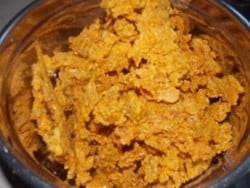
How to Dehydrate Eggs Steps
Ingredients
- 3 1/2 dozen eggs
Instructions
- Start with your eggs. This was 3 1/2 dozen total.• Crack them open into a bowl, about 18 at at time. More than that and it will take a loooooong time to do the next step.
- Whisk them like crazy, to get them all mixed together.
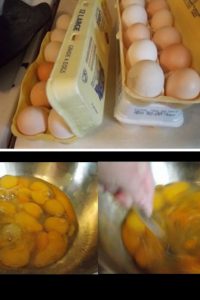
- Scramble them over medium to medium-low heat. I used a cast skillet iron so I wouldn’t have to add any additional oil. This took about 25 minutes to cook on low heat.
- Lay them out on a dehydrator sheet. 3 dozen eggs took up 7 sheets, Spread out as thin as possible.
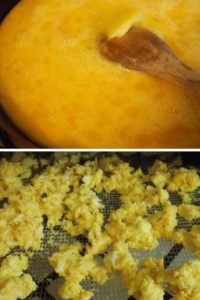
- Dehydrate at 160 °F (71 °C) for 10 hours.

- Place dry eggs in a food processor (or blender) and whirrrr for a minute or two. This will process them down into a fine powder so that they are not grainy when you try to reconstitute them. Blend on high for best results. If you don’t have a blender, you could use a mortar and pestle or a seed grinder.
- Store in a cool, dry place in a tightly covered container.
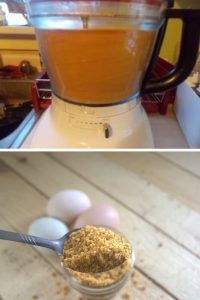
Tips for Dehydrating Eggs
The first thing to know is that you can dehydrate both raw and precooked eggs. If you dehydrate raw eggs, you’ll notice that they have a less gritty texture.
You don’t have to worry about contamination, either, as you’re going to cook them when you rehydrate them anyway.
You can also cook them beforehand, which is what the method above suggested. If you dehydrate, fresh raw eggs, you’ll follow the exact same steps I told you about before, except you’ll skip the step where you scrambled them on the stove. Just jump right to the dehydration process.
If you want to make the eggs easier to powder/grind, take the dehydrated eggs and freeze them first. Then pop them into a blender and you should get a nice egg powder.
If you don’t have a dehydrator, keep in mind that you can also dehydrate eggs in your oven. Ideally, your oven should be set to about 115 degrees Fahrenheit to do this
If your oven doesn’t go to temperatures lower than 170 degrees (which, unfortunately, is common) then this method will not work for you.
It should also be noted that the oven method of dehydration can be messier, more difficult, and even smellier than the dehydrator method.
Start by pouring your eggs onto nonstick cookie trays. Pour or spread them out so that they are distributed evenly. In most cases, you’ll be able to fit up to 12 eggs per baking sheet.
It’s important that you don’t coat the tray with any kind of oil before beginning this process. Fats will cause spoilage later on, plus they can cause the eggs to separate.
Then, you’ll bake the eggs until they are crispy, stirring them often. It can take up to twelve hours but often takes only six. Make sure you stir the eggs every couple of hours to promote even drying.
If some dry faster than others, you can remove them to prevent them from becoming scorched and allow the others to continue drying.
How to Store and Use Dehydrated Eggs
Dehydrated eggs’ shelf life, in my experience, is about a year, stored in a tightly closed container.
You don’t need to leave any headspace, but ideally, you should use a container with non-permeable sides, like one made out of glass.
Mason jars are a good option for this, pack your powdered/dehydrated eggs into them with moisture and oxygen absorbers, secure the lid, and store them away from light.
An even better container is one that can be vacuum sealed after packing. Use a vacuum sealer and a few mylar bags and vacuum seal your eggs. The vacuum-sealed bags can then be stored in the freezer.
As for how to cook dehydrated eggs, add 1 Tablespoon eggs to the dry ingredients in a recipe, and 1/4 cup additional water to the wet.
However, there are some homesteaders out there who claim that dried eggs can be shelf-stable and used for as long as ten years (so long as they were stored in cool, dry, and dark conditions, and were rotated every three years.
This is so important to note, as dehydrated eggs require a lot less storage space – and fewer resources – than regular eggs.
You can use powdered eggs as they are, serving them up in your favorite egg or breakfast meal, or you can mix them into recipes where eggs are called for (sometimes, they won’t work as well in baked goods where whole eggs are required, though).
If you’re baking, you do not need to rehydrate the eggs before adding them. You’ll just add the egg powder and any water you need before continuing with the recipe as listed.
Whether you’re using them in pancakes or in quiche, you’ll love the versatility that powered eggs provide!
Have you ever tried to dehydrate eggs? Would you ever try them? What would you use powdered eggs for first? Be sure to pin this for later!
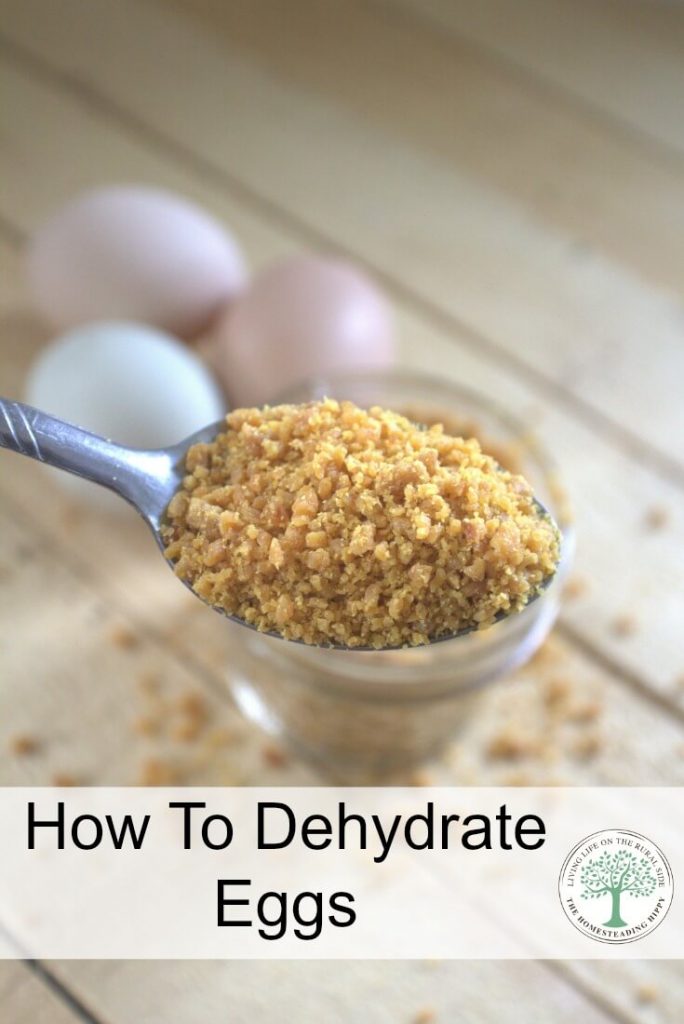

Heather’s homesteading journey started in 2006, with baby steps: first, she got a few raised beds, some chickens, and rabbits. Over the years, she amassed a wealth of homesteading knowledge, knowledge that you can find in the articles of this blog.
Learn more about Heather and the rest of the writers on this page.

Wow – this is great! I have never thought about dehydrating my own eggs before! I can’t wait to try this out. Thank you so much for this recipe and tutorial. I am definitely going to use it. Vickie
thanks for coming by, Vickie!! let me know how your eggs work out!
I have dehydrated and rehydrated fresh eggs.
We can barely even ever tell the difference between a fresh egg and the powdered egg.
Used in baking I have had no problem.
What’s the Dehydrated Egg to, let’s say 3 scrambled eggs, breakfast Ratio?
Example 1 cup egg powder = 3 Eggs
1 Tbs of egg powder and 2 Tbs of water equals 1 egg
I always knew it was possible to dehydrate eggs, When my son was little I got this thing called community foods, where the state got foods from the government, it was nutritian stuff, peanut butter, cheese, powdered eggs, juice, fruit veggies, cerial and powdered milk. the eggs tasted pretty good in cakes and scrambled, even omelets were good with them. I am fixing to do some for my bug out room foods. I have dehydrated so many things lately, my favorite is pineapples and tomatoes. thank you for this site >>>DEE
Is the 1 Tablespoon eggs & 1/4 cup additional water to be used per egg in the recipe?
yes, that is what I have done.
Placing dry goods in a mason jar, slowly heating, washing & drying proper lids, placing on jars directly out of the oven. Jars will seal automatically because of heat. Let cool & check for seal before storage.
Just wanted to say that I add powdered milk to rehydrate for scrambled eggs. Taste so much better and has a fluffier texture. I is about 1 tsp per 3 eggs.
canning jars never go in oven. Canning jars are not made for dry heat.
Dry canning isn’t a healthy alternative for vacuum sealing. The heat in oven can bring latent moisture out and cause mold or botulinum toxin to grow. Regular canning displaces air with steam and creates an anaerobic environment as it escapes from the lids. With dry canning you take the food from the oven without a lid on it and it and capture air and germs back into the jar. Just because a jar is sealed doesn’t mean it doesn’t have germs in it.
Can I oven can these eggs for long storage? Does 1 TBSP. equal 1 egg?
I don’t see why you couldn’t. Yes, 1 T.= 1 egg
What is even canning? I would like to know. I’ve never heard of this
Sorry meant “oven “
You can’t use mason jars for oven canning so I don’t know. Mason jars are not useful in dry heat
I just found your blog. So glad I did. The powdered dehydrated eggs can be used in baking? This is just what I’m looking for. I’m confused because they are cooked. When you rehydrate them they don’t turn back into scrambled eggs? Thank you for your help.
yes, just add the extra liquid with the eggs to use in baking.
You don’t use cooked dehydrated eggs for baking. You dehydrate RAW eggs then use the resulting powder for baking.
Since you mention recipes, will the work as scrambled eggs? If so, how should we do that? Thanks.
115 degrees is not hot enough to destroy Botulism. A minimum of 160 degrees is required, and 165 degrees is better.
I think the temp to kill botulism is actually up in the 200s, way over boiling, which is why you’re supposed to can food in a pressure cooker – so the water in the jar can get up much hotter than it’s able to at regular atmospheric pressure. The main problem with eggs would be salmonella, which I think is killed at 160-ish? You can, however, kill it at lower temperatures if you heat it for longer. Either way, 115 isn’t going to kill it. Here, I found this quote: “Salmonella is killed by heating it to 131 F for one hour, 140 F for a half-hour, or by heating it to 167 F for 10 minutes.” Botulism I think only thrives in low-oxygen environments.
Sara, I believe you meant to say pressure canner, not cooker? It’s safer.
You will cook these in some manner so that’s where your temps are high enough to kill bacteria. BUT we eat raw eggs from our chickens ALL the time in homemade mayo and I feel good about that.
Botulism is a toxin. You can’t “kill” a toxin; you can only kill the bacteria before they produce the toxin, and that is why this kind of thing is iffy.
Heat will not kill Botulism. I think you are thinking about Salmonella. Dehydrated eggs are safe to use if cooked throughly after rehydration.
I love this idea. I think I’ll try dehydrating the whites only to use in egg drop soup and to stiffen cake icing.
Hi, I made these dehydrated eggs (3 different times). I’ve done them at 165′ for 18hrs, 135 for 8hrs and 165 for 8 hrs. I have added my water and left them sit for a variety of 5, 10 and 15 minutes. I have tried the 1/4 cup and the 1T egg – 2T water version also. It doesn’t matter what I do they still come out like rubber. I spit them out every time. Does anyone else have this problem? If not – what are you doing? Thanks
I had to play with the dehydrated eggs to get them to work properly. After several tries I determined that I needed more water, not less and it is imperative to let the eggs fully rehydrate. At least 30 minutes – 1 hour. When we use them for camping, I let them soak overnight. Then when they are cooked they are just like regular scrambled eggs.
What ratio of water to eggs did you end up finding worked the best for reconstituting them?
1 Tablespoon egg powder to 2 Tablespoons water.
I dehydrate at 60C (~140F) for 12 hours….then grind in a food blender, then put back in for 4 hours. The key, imo, is to NOT cook your eggs when dehydrating because of too high a temp AND also, I put down thin layers of egg liquid in each tray – don’t make it too thick. Lots and lots and lots on information online re: best temp, but I ended up with 140F based on the more experienced homesteaders. After 12 hours I grind the eggs in a blender…..sometimes I find that a very small portion of the egg is not dry enough (probably some ‘dead’ spots in my dehydrator OR the liquid per tray was too much/too thick). I try to move the trays around every 4 hours but often forget. My point is – after grinding the eggs they go back in for another 4 hours just to make sure everything is super dry. In terms of rehydrating I get the best results with 1 part egg, 1 part milk, 0.5 part water…..lots of people do 1 part milk (e.g. 1 tbsp) with 2 parts water (e.g. 2 tbsp)….i find this ratio too liquidy (is that a word? lol). I also let the eggs sit in mixture overnight in fridge, then whisk gently and this way you can easily tell if the mixture needs a touch more water or milk (sometime it does – you just have to eyeball what works best for you). I use a good dab of butter to scramble/fry up and a good dab of salt. I really like the texture and taste i get following all of the above. Hope this helps others.
If I store dehydrated eggs in a mason jar, how long does it last in the refrigerator? Freezer?
Do we need to air tight the jar? And how long does it last that way?
Thank you!
We have 3dz. Chic, and we do run out of space in the ‘fridge. We have heavy breeds that lay year round. We do alot of canning, dehydrating, and dry canning. I really want to dehydrate eggs. Why is it necessary to powder them after drying them? I would prefer not to do this step. Would it be possible? Please let me know. I would like to do this very soon.
The idea behind powdering the eggs is that they will take up less space than otherwise. I haven’t tried this yet, but I do dehydrate mashed potatoes quite often. I find that if I jar them without powdering them (I use a coffee grinder), they take a 1 pint (16 oz) jar to store them. If I powder them, they only need a 4 oz jar for the same amount. I believe the same applies to the eggs.
I would like to dry can the egg powder. How long and what temp in the oven? And will this process help to keep from spoiling and salmonella for long term storage?
Has anyone tried separating the egg yolks/whites first, then dehydrating them separately? And if so, are the whites “whippable” after rehydrating?
Yes, the egg whites are whippable after rehydrating. It just takes a little longer for them to whip. I do it all the time. I mix equal parts dehydrated egg white to the same amount of water and set it in my mixer. It generally takes about 4 min or so and it whipped up just like fresh egg whites.
Are the egg whites raw when you dehydrate them? or do you cook the egg whites and then dehydrate?
Thanks! I too want to try this. The comment section was extremely helpful.
How long does it take to dehydrate at 115º?
For anyone wanting the science behind dehydrated eggs, freeze dried eggs and how they are used commercially
https://www.sciencedirect.com/topics/agricultural-and-biological-sciences/dried-eggs
Can you bake with the precooked dehydrated eggs? I tried doing raw, but my trays are slightly uneven.
Thank you everyone for the input. I was looking at buying dehydrated eggs and thought “why can’t I just do it myself”? So here I am. Just thinking long term because the supply chain is so fragile. Currently I don’t live where I can have chickens of my own.
Thank you for posting how to dehydrate eggs, got busy and they are now in the dehydrator. A big thumbs up from Queensland Australia.
If I cook the eggs first, can I still use them for baking?
With 10 ducks, I have a TON of eggs taking up space on my counter and in the refrigerator. I ordered a dehydrator today. It will get here on Saturday, and I’m looking forward to having refrigerator space again! LOL